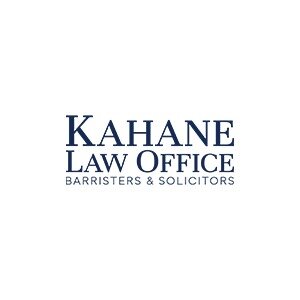Best Car Accident Lawyers in Edmonton
Share your needs with us, get contacted by law firms.
Free. Takes 2 min.
List of the best lawyers in Edmonton, Canada
About Car Accident Law in Edmonton, Canada
In Edmonton, Canada, the law regarding car accidents is governed by the Traffic Safety Act and the Insurance Act of Alberta. Majority of the car accidents are handled under a no-fault insurance system which means regardless of who is at fault, everyone gets the benefit from their own insurance company. However, in case of serious injury or death, a lawsuit can be filed against the at-fault driver. This involves legal intricacies where having a professional legal counsel becomes beneficial.
Why You May Need a Lawyer
Though minor car accident issues can often be resolved through direct communication between the involved parties or their insurance companies, there are situations where an attorney may prove vital. When the fault is under dispute, when serious injuries are involved, or when an accident results in a fatality, legal assistance can guide you through the complex process, protect your rights and ensure that you secure the best possible outcome. Moreover, if you plan on suing for pain and suffering damages, an experienced lawyer can help increase the compensation.
Local Laws Overview
In Edmonton, the Traffic Safety Act requires that drivers stop and exchange detail after an accident. Any car accident causing bodily injury, death or property damage of more than $2,000 must be reported to the police. It's also worth noting Alberta's "15% rule," which pertains to not-at-fault drivers and allows you to recover 100% of your eligible accident benefits, even if you were found 15% or less at fault.
Frequently Asked Questions
What Should I Do After a Car Accident in Edmonton?
First, seek immediate medical attention if necessary. Then, report the accident to the police, ensure to trade information with other drivers involved and inform your insurer about the accident. It's also recommended to take photos of the scene, if possible.
Can I Sue the At-Fault Driver?
You can pursue a lawsuit in cases of serious injury or death. However, claims are typically made against the at-fault driver's insurance company. To effectively navigate this, legal counsel is advised.
How Long Do I Have to File a Claim?
The limitation period in Alberta is generally two years from the date of the accident. However, it may vary depending on the specific circumstances of the case.
What Damages Can I Recover?
Dependent on the particulars of your case, you may be entitled to recover damages for medical expenses, loss of income, property damages, pain and suffering, and more.
Can I Settle Without a Lawyer?
Yes, you can but it's advisable to have legal representation to get the full benefits you're entitled to. Insurance companies often aim to minimize payouts, and a lawyer can help you negotiate a fair settlement.
Additional Resources
Inquisitive individuals can refer to the official websites of Alberta Traffic Safety, Alberta Motor Association, and Alberta Insurance Council for further information. Additionally, Alberta Health Services can provide information on coping with post-accident trauma.
Next Steps
If you need legal assistance due to a car accident in Edmonton, start by researching and identifying experienced local car accident lawyers. Schedule consultations, prepare your case information, and bring all the relevant documentation to the meetings. From there, listen to their advice and decide on the next course of action based on your unique circumstances.
Lawzana helps you find the best lawyers and law firms in Edmonton through a curated and pre-screened list of qualified legal professionals. Our platform offers rankings and detailed profiles of attorneys and law firms, allowing you to compare based on practice areas, including Car Accident, experience, and client feedback.
Each profile includes a description of the firm's areas of practice, client reviews, team members and partners, year of establishment, spoken languages, office locations, contact information, social media presence, and any published articles or resources. Most firms on our platform speak English and are experienced in both local and international legal matters.
Get a quote from top-rated law firms in Edmonton, Canada — quickly, securely, and without unnecessary hassle.
Disclaimer:
The information provided on this page is for general informational purposes only and does not constitute legal advice. While we strive to ensure the accuracy and relevance of the content, legal information may change over time, and interpretations of the law can vary. You should always consult with a qualified legal professional for advice specific to your situation.
We disclaim all liability for actions taken or not taken based on the content of this page. If you believe any information is incorrect or outdated, please contact us, and we will review and update it where appropriate.









